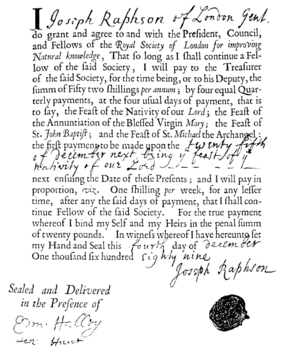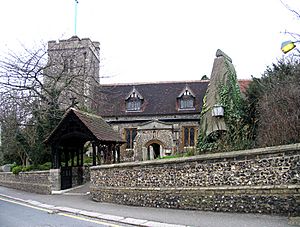Joseph Raphson facts for kids
Quick facts for kids
Joseph Raphson
|
|
|---|---|

Bond signed by Joseph Raphson on his admittance to the Royal Society
|
|
| Born | c. 1668 |
| Died | c. 1712 |
| Nationality | English |
| Alma mater | University of Cambridge |
| Known for | Newton–Raphson method |
| Scientific career | |
| Fields | Mathematician |
| Signature | |
Joseph Raphson (born around 1668, died around 1715) was an English mathematician. He was a smart thinker known for his work in mathematics. He is best remembered for a special way to solve equations. This method is called the Newton–Raphson method.
Contents
Who Was Joseph Raphson?

We do not know much about Joseph Raphson's early life. He was probably born in 1668. This is based on a book review from 1691. It said he was 22 years old then. His parents were likely Ruth and James Raphson. He might have been baptised in Pinner, Middlesex, England.
Becoming a Royal Society Member
On November 30, 1689, Raphson became a Fellow of the Royal Society. This is a group of important scientists. Edmund Halley, a famous astronomer, suggested him for membership. In 1692, Raphson earned a Master of Arts degree. He got this from Jesus College, Cambridge. He described himself as being "of London."
His Most Famous Work: The Newton-Raphson Method
Raphson's most important book was Analysis Aequationum Universalis. It was published in 1690. This book described a way to find approximate answers to equations. Today, we call this the Newton–Raphson method.
Another famous scientist, Isaac Newton, had a similar method. Newton wrote about it in 1671. But his work was not published until 1736. That was almost 50 years after Raphson's book. Raphson's version of the method is simpler. Because of this, it is often taught in textbooks today.
Supporting Isaac Newton
Raphson strongly supported Isaac Newton. He believed Newton was the only inventor of calculus. Calculus is a very advanced part of mathematics. Another scientist, Gottfried Leibniz, also claimed to invent it. Raphson also translated one of Newton's books into English. This book was called Arithmetica Universalis.
Coining a New Word: Pantheism
Raphson also created a new word: pantheism. He used it in his book De Spatio Reali. This book came out in 1697. Pantheism is a belief that God is everything. It means God is in all things and is the universe itself.
Raphson said there were two types of beliefs. One was panhylists, who thought everything came from matter. The other was pantheists. They believed in a universal substance. This substance was both material and intelligent. It created everything from its own being. Raphson also thought the universe was too big for humans to fully understand.
A Book After His Death
After Raphson died, one of his books became part of a big argument. This argument was about who invented calculus first. Isaac Newton seemed to take control of publishing Raphson's last book. It was called Historia fluxionum. Newton added some letters to it. These letters were from Leibniz and Antonio Schinella Conti. He used them to support his side of the argument.
It is surprising how little is known about Raphson's life. He might have been from Ireland.
 | Selma Burke |
 | Pauline Powell Burns |
 | Frederick J. Brown |
 | Robert Blackburn |

